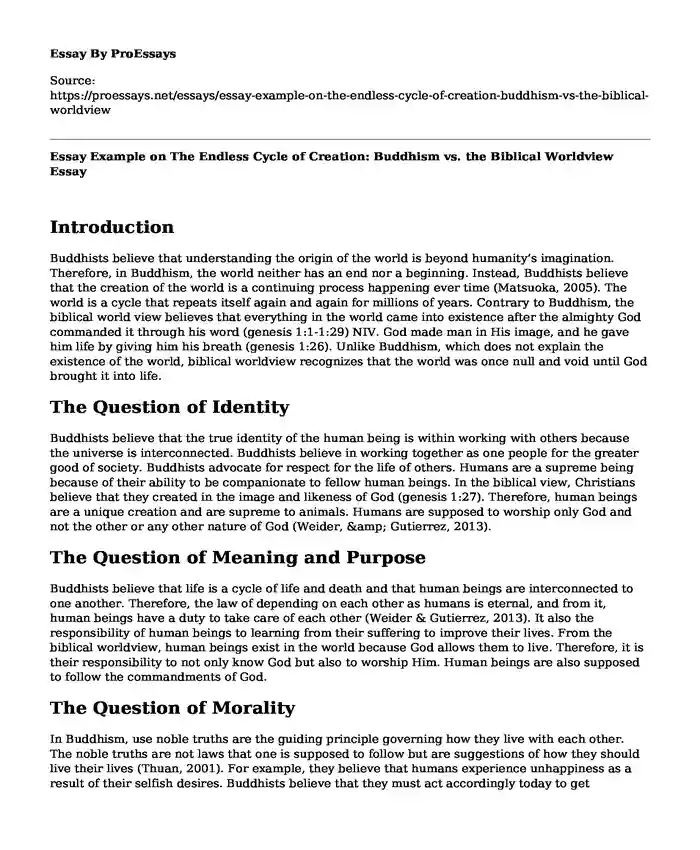Introduction
Buddhists believe that understanding the origin of the world is beyond humanity’s imagination. Therefore, in Buddhism, the world neither has an end nor a beginning. Instead, Buddhists believe that the creation of the world is a continuing process happening ever time (Matsuoka, 2005). The world is a cycle that repeats itself again and again for millions of years. Contrary to Buddhism, the biblical world view believes that everything in the world came into existence after the almighty God commanded it through his word (genesis 1:1-1:29) NIV. God made man in His image, and he gave him life by giving him his breath (genesis 1:26). Unlike Buddhism, which does not explain the existence of the world, biblical worldview recognizes that the world was once null and void until God brought it into life.
The Question of Identity
Buddhists believe that the true identity of the human being is within working with others because the universe is interconnected. Buddhists believe in working together as one people for the greater good of society. Buddhists advocate for respect for the life of others. Humans are a supreme being because of their ability to be companionate to fellow human beings. In the biblical view, Christians believe that they created in the image and likeness of God (genesis 1:27). Therefore, human beings are a unique creation and are supreme to animals. Humans are supposed to worship only God and not the other or any other nature of God (Weider, & Gutierrez, 2013).
The Question of Meaning and Purpose
Buddhists believe that life is a cycle of life and death and that human beings are interconnected to one another. Therefore, the law of depending on each other as humans is eternal, and from it, human beings have a duty to take care of each other (Weider & Gutierrez, 2013). It also the responsibility of human beings to learning from their suffering to improve their lives. From the biblical worldview, human beings exist in the world because God allows them to live. Therefore, it is their responsibility to not only know God but also to worship Him. Human beings are also supposed to follow the commandments of God.
The Question of Morality
In Buddhism, use noble truths are the guiding principle governing how they live with each other. The noble truths are not laws that one is supposed to follow but are suggestions of how they should live their lives (Thuan, 2001). For example, they believe that humans experience unhappiness as a result of their selfish desires. Buddhists believe that they must act accordingly today to get enlightened. The biblical worldview dictates that Christians have to refer to the bible for guidance on what is wrong and right. For example, the Ten Commandments state the rules that Christians are supposed to follow strictly. Morality is determined by the actions or thought that a person has.
The Question on Destiny
In Buddhism, the destiny of human beings is to attain enlightenment like Buddha. The paths to enlightenment mainly require one to follow the teaching of Buddha. An enlightened person understands human emotions and suffering, just like Buddha. Christians believe that after death, one will head to either heaven or hell. The righteous ones will go to heaven and receive eternal happiness. The ones who do not follow the teachings of God will go to hell and suffer forever.
References
Matsuoka, M. (2005). The Buddhist concept of the human being: From the viewpoint of the philosophy of the Soka Gakkai. The Journal of Oriental Studies, Vol 15. Retrieved from http://www.sgi.org/resources/study-materials/the-buddhist-concept-of-the-human-being-from-the-viewpoint-of-the-philosophy-of-the-soka-gakkai.html
The Bible. Authorized King James Version, (1998) Oxford UP. http://lambfold.org.uk/sitebuildercontent/sitebuilderfiles/kjvbible.pdf
Thuan, T. X. (2001). Cosmic design from a Buddhist perspective. Annals of the New York Academy of Sciences, 950, 206–214. https://doi.org/10.1111/j.1749-6632.2001.tb02139.x
Weider, L. and Gutierrez, B., (2013). Finding Your Worldview: Thinking Christianly About The World. 1st ed. [ebook] Lew Weider and Ben Gutierrez. Database, p.59. Available at: <http://www.mywsb.com>
Cite this page
Essay Example on The Endless Cycle of Creation: Buddhism vs. the Biblical Worldview. (2023, Sep 20). Retrieved from https://proessays.net/essays/essay-example-on-the-endless-cycle-of-creation-buddhism-vs-the-biblical-worldview
If you are the original author of this essay and no longer wish to have it published on the ProEssays website, please click below to request its removal:
- Essay Example on Religion in the News Report
- The Nature of Faith Essay
- Marriage Traditions in Islam and Christianity Essay
- Christian Views on the Nature of Human Persons and Theory of Morals Status Essay Example
- Is the Gospel of Jesus Christ Real? - Essay Sample
- Essay Example on Al-Qaeda: Global Terror Network with Extremist Roots
- Essay on Buddhism in Japan: Origins & Impact on Society







